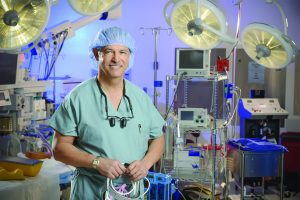Photo courtesy of St. Jude Medical


Health, performs minimally invasive aortic valve replacement surgery.
Miniaturized Wireless Monitoring Sensor — This miniaturized wireless monitoring sensor is about the size of a dime, and remotely provides updates each day to the physician on pressure levels affecting the heart.
While many heart conditions can be managed or overcome with lifestyle changes and medication, others require surgical intervention to restore an individual’s desired quality of life. Recent advances in medical science and technology are helping people with common heart conditions avoid lengthy hospital stays and major incisions, saving money and reducing recovery times, according to a cardiac surgeon and a cardiologist at Venice Regional Bayfront Health.
Two minimally invasive surgical procedures offered at Venice Regional address heart failure and aortic valve replacement.
Heart failure is one of the most common cardiac conditions in the nation. According to the American Heart Association, more than 5 million people in the United States suffer from heart failure each year. It is the number one cause of hospital admissions, and 50 percent of patients treated for the condition are readmitted to the hospital within six months.
“Today, we can implant a miniaturized, wireless monitoring sensor that reduces the risk of heart failure and hospitalization through earlier, more precise detection of symptoms,” said Jim Landis, M.D., an interventional cardiologist at Venice Regional.
“The device, which is about the size of a dime, is implanted in the pulmonary artery during a minimally invasive procedure. It remotely provides updates each day to the physician on pressure levels affecting the heart,” Dr. Landis said.
“Often with just a phone call, we can determine whether to adjust the patient’s medication, or we can discuss lifestyle choices that may be contributing factors. A high-sodium diet the previous day may be the culprit, for instance,” he said.
At 84, Ned Carter of Englewood is glad to have the monitoring device to help him manage his heart condition. After frequent heart failures and related hospitalizations in his adult life, Carter has not been to the hospital since Dr. Landis implanted the device.
“All I do is lie on this special pillow every day, and the device sends information to the doctor,” Carter said. The medical team has adjusted his medication on at least one occasion, he said, but otherwise, he simply maintains routine follow up exams with his cardiologist.
Another minimally invasive surgery offered at Venice Regional is radically different from the traditional “zipper” up the chest associated with open heart surgery.
For patients requiring an aortic valve replacement, the most common surgical option has been to open the chest, requiring lengthy hospitalizations and recovery times.
“Patients are seeing dramatically reduced hospitalizations and are able to return to normal activities much faster after undergoing a valve replacement procedure that we perform at Venice Regional,” said Roberto Cervera, M.D., director of cardiovascular surgery at Venice Regional. “A small, two-inch incision below the right collar bone is all that is needed to give us access, and we are able to replace the damaged valve with a new, artificial valve.
A study published last year in The Annals of Thoracic Surgery reported that patients over 75 who received the minimally invasive procedure had fewer complications during the procedure, a dramatically lower risk of kidney failure following surgery, a lower rate of wound infection, and shorter hospital stays. Dr. Cervera said patients at Venice Regional who receive the minimally invasive procedure average three days of hospitalization, which is half the time generally required for conventional valve surgery. Recovery to normal activities also is more rapid.
Thomas Stasienko of North Port can attest to the quick recovery many patients experience with the procedure.
“I was in for surgery on Thursday and out of the hospital by Saturday,” said Stasienko, who was accustomed to leading an active lifestyle as a softball and pickleball player. Since the surgery, he has been able to return to his favorite sports.
Stasienko’s friend, Cindy Knowles, a surgical technician and Licensed Practical Nurse, was impressed with the procedure and Stasienko’s speedy recovery.
“I don’t think he could have gotten better care anywhere else,” Knowles said. “I had participated in minimally invasive valve procedures before, but not with this technique. I was very impressed with the care, the doctors, and the hospital.”
“Given the advanced age of many of the residents in our community, this is an important option for patients to discuss with their cardiologists,” Cervera said. “This is challenging the conventional wisdom that these patients are too old to undergo valve surgery, that they must simply live with their condition and accept diminished quality of life.”
If you or a loved one have questions about heart health and recent advances in cardiac surgery, call (941) 483-7727.
 Southwest Florida's Health and Wellness Magazine Health and Wellness Articles
Southwest Florida's Health and Wellness Magazine Health and Wellness Articles

